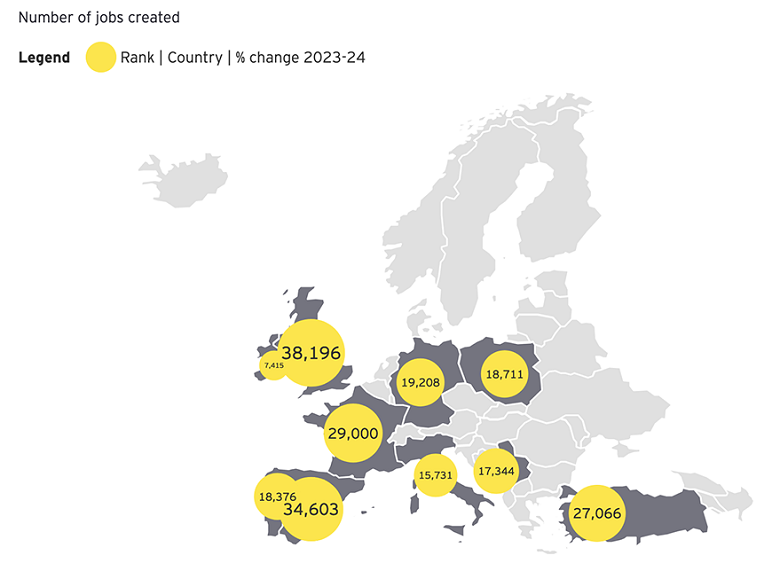Spain leads 2024 foreign investment increase in Europe

It is the second European country in terms of FDI-related job creation, with a total of 34,603 jobs.
According to the EY Europe Attractiveness Survey, the annual attractiveness survey conducted by EY, foreign direct investment (FDI) continued to grow in Spain in 2024, as opposed to a downward trend across Europe. Investment only increased in Central, Eastern and Southern Europe, with Spain leading the way thanks to a 15% increase in the number of projects announced, with a total of 351.
According to the EY study, Spain has become the fourth largest FDI destination in Europe. The study explains the reason for this as being a combination of strong economic performance, relatively low energy and labour costs and an abundant supply of land. Another influence was the 163 billion in funding received through the NextGenerationEU programme, the second largest amount granted in the EU.
Job creation
Spain also stood out last year as the country with the second highest FDI-related job creation. 34,603 jobs were created, in fact, compared to a 16% decrease in the total number for the continent, which recorded 269,740 new jobs.
In terms of the average for the countries analysed, FDI fell by 5% in 2024, while manufacturing investment declined by 9%. A total of 5,383 start-up and expansion projects were announced in 45 European countries, compared to 5,694 in 2023. 37%of the 500 companies surveyed postponed, cancelled or reduced their European investment plans over the past year.
Fourth largest FDI destination in Europe
The analysis points to slow economic growth, persistently high energy prices and an unstable geopolitical environment as the main reasons for this fall, which occurred for the second year in a row. While Spain grew to become the fourth largest FDI destination in Europe, France, the UK and Germany retained the top three positions, despite declines of 14%, 13% and 17% respectively.
US policies are reducing Europe’s attractiveness according to 42% of respondents. However, 61% expect investment to improve over the next three years. On the positive side, there are early signs that Europe will be able to attract investment in industries that will dominate FDI, such as renewable energy, semiconductors, pharmaceuticals, artificial intelligence and electric vehicles. Among the examples, the report cites the 1.3 billion euros that AstraZeneca will invest by 2027 to expand its scientific innovation presence in Spain, with plans to hire 1,000 employees when it opens its new R&D centre in Barcelona.
Vital pillar of the Spanish economy
EY-Parthenon’s Managing Partner in Spain, Juan López del Alcázar, explained that FDI is “a vital pillar of the Spanish and European economy. The results of this survey show that we need to focus on future-oriented industries that can drive growth in the Spanish economy. While Spain is very well-positioned in Europe in emerging industries, such as renewable energy, we still have room for growth in this area and in others, such as artificial intelligence and electric mobility.”
Looking ahead to this year, the report describes the performance of several southern and central European countries as encouraging, with the Spanish economy forecast to grow by 2.8% in 2025, well above the EU average.
Photo: EY




